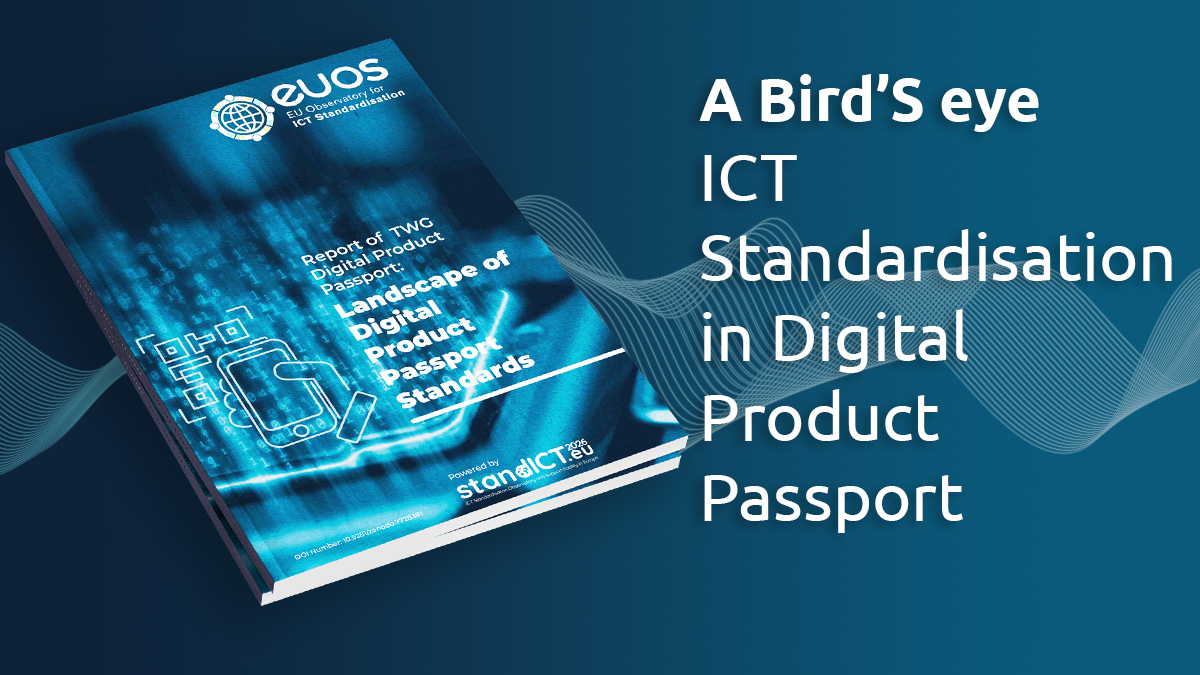Read time: 3 mins

Pisa, Italy – 22nd March 2023. The StandICT.eu Technical Working Group on the Digital Product Passport (DPP) has released the landscape analysis report which specifies the predefined areas of Standardisation for the successful implementation of the Digital Product Passport. This requires interoperability on various areas, including different aspects of the DPP-system as well as the DPP-data.
Digital product passports aim to gather data on a product and its supply chain and share it across entire value chains so all actors, including consumers, have a better understanding of the materials and products they use and their embodied environmental impact. The digital product passports initiative is part of proposal for a new Ecodesign for Sustainable Products Regulation (ESPR) and one of the key actions under the Circular Economy Action Plan (CEAP).
The standards-based DPP will be aligned with the requirements of the ESPR, with an initial focus on the electronics, batteries, and textile sectors.
Dr. Jens Gayko, Standardization Council Industry 4.0 and TWG DPP Chair; Benjamin Helfritz, DIN - Deutsches Institut für Normung e. V. and TWG DPP Co-Chair
The landscape analysis report on the Digital Product Passport lists 186 international and European standards from recognised standardisation bodies - according to EC 1025/2012 directive - and further 78 standards from other standards developing organizations.
StandICT.eu Technical Working Group DPP also provides a first assessment of the relevance of the listed standards, in addition to the basic information on the standards, such as title and publication date. The created list covers more than 200 open standards of international standards development organisations, which are made available or will be made available to the general public and are developed (or approved) and maintained via a collaborative and consensus driven process.
The following document and list are thought as a contribution to the current discussion and should help the development of the subject matter by the EU Commission, the existing initiatives, such as the CIRPASS or Battery Passport Project, as well as the later treatment in the European Standardization Organizations CEN, CENELEC and ETS.
Dr. Jens Gayko, Standardization Council Industry 4.0; Benjamin Helfritz, DIN - Deutsches Institut für Normung e. V.
The landscape analysis report covers seven areas of standardisation needs: Data carriers; Unique identifiers and their verification; Link between physical product and digital representation, look-up mechanism; Access rights management; Interoperability (technical, semantic, organisation), including data exchange protocols and formats and data processing (introduction, modification, update); Data storage, Data authentication, reliability, integrity, security and privacy.
Since its start, StandICT.eu has launched in EUOS 12 other like-minded Technical Working Groups tackling ICT fields such as Blockchain (TWG BLOCK), Big Data Spaces and Data Interoperability (TWG BDDI), Cybersecurity (TWG Cyber), Artificial Intelligence (TWG AI), Trusted Information (TWG TRUSTI), Digital Twin (TWG Digital Twin), Iot and Edge Computing(TWG EDGE & IoT), Ontology (TWG Ontology), Big Data For Smart Cities (TWG Big Data For Smart Cities), Robotics (TWG Robotics), Digital Product Passport (TWG DPP) and Standards Education (TWG ACADEMY) where further Landscape and Gap Analysis Reports will be published as part of the series.
Find out more and download our series of Landscape Analysis Reports!
In parallel, StandICT.eu 2026 will provide € 2,925,000 to fund European ICT experts through a series of (9) Open Calls to participate in international Standardisation Developing Organisations' working groups across the wide-range of topics identified in the EC Rolling Plan for ICT Standardisation. The first Open Call for applicants will be launched next May 2023..
Read the full Landscape analysis report on the Digital Product Passport on Zenodo.